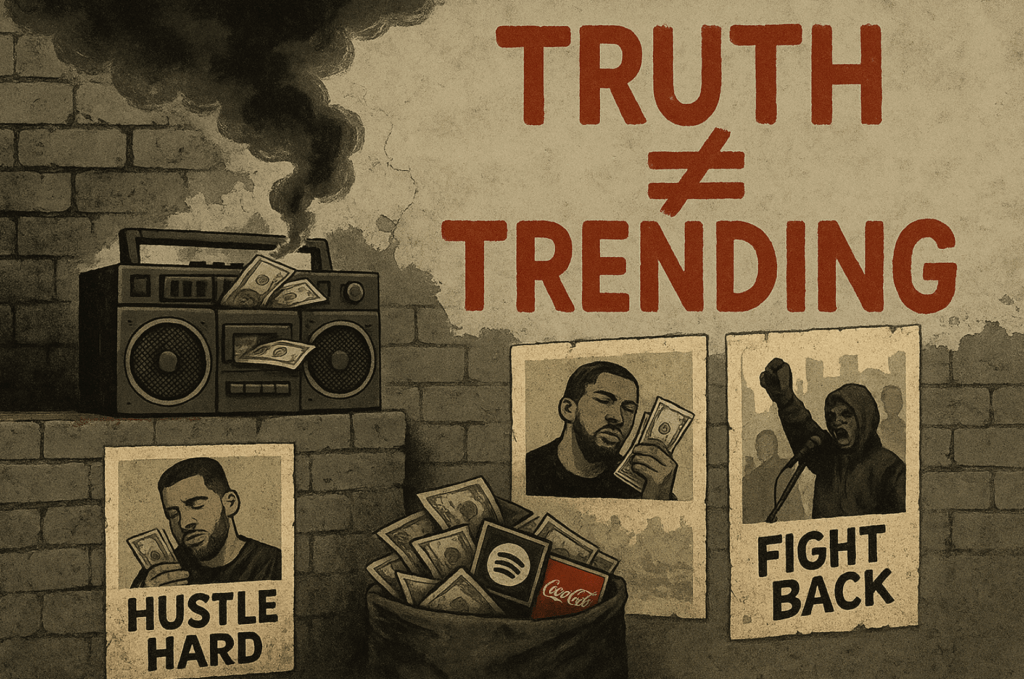The revolution will not be algorithm-friendly.

There’s a certain kind of mainstream hip hop lyric these days that lands with all the weight of an inspirational quote on a fridge magnet. You’ve heard it: “I came from the bottom and now I’m up.” Or perhaps: “Hustle hard, trust no one.” Sometimes, for a splash of faux profundity: “Pain made me who I am.” This is rap as motivational wallpaper — smoothed out, algorithm-tested, and cleared for advertising syncs.
It’s not that these statements aren’t true. It’s that they’re truistic — sentimentally safe, uncontroversial, and as threatening to power as a scented candle. They sound profound until you realise they could apply equally to a CEO LinkedIn post or a Peloton instructor. And yet, these are the slogans of the streaming era — endlessly looped over beats that are big enough to move crowds but rarely pointed enough to move conversations.
All this begs the question: when truisms lead the way commercially, where does that leave the uncomfortable truths? You know — the ones hip hop was born to tell.
Let’s be clear: rap didn’t start with vague affirmations and “get money” mantras. It started as a cultural riot in rhyme, a way for young people of colour to document systemic neglect, police brutality, racist housing policies, and generational injustice — all while making it sound cooler than anything else in the world.
But in 2025, if you rely on the mainstream for your hip hop intake, you might not even realise the genre had a message once. You’ll hear Drake float through a verse about existential loneliness in a penthouse. You’ll hear Post Malone mumble about ambiguous trauma and “being on the road.” And you’ll hear an army of playlist rappers offer variations on “they doubted me, now I’m rich.” It’s the equivalent of pouring oat milk on your cereal while the world burns.
This isn’t about snobbery — it’s about content. Or rather, the lack of content with actual stakes. We’re in an era where Gaza is in ruins, food banks are overflowing, and Black lives are still treated as optional extras in policing policy — and the charts would have you believe the only crisis worth discussing is your ex not texting back.
Meanwhile, in the underground, there are artists doing the work — not just lyrically, but socially. Take Lowkey, who raps about Western imperialism with the rage of a man who knows exactly how many bombs the UK has sold to Saudi Arabia. Or Little Simz, who gives you introspection with orchestras and still makes time to shout out community resistance. “If I give you the truth, would you really want it?” she asked on Introvert. The answer, commercially, seems to be: not really — unless there’s a vibe for TikTok to dance to.
Brother Ali once said, “The truth is too raw, people want something bland that won’t scar.” Meanwhile, on the other side of the spectrum, here’s French Montana in 2023: “I got more cheese than a pizza.” A truth, perhaps. Just not the kind that shifts consciousness.
There are mainstream anomalies, to be fair — brief flickers of conscience in the conveyor belt of club bangers. Kendrick Lamar stands alone here: Pulitzer-winning, chart-topping, and still spitting lines like “Institutionalised, I keep running back for a visit.” His Mr. Morale & the Big Steppers was messy, uncomfortable, and complex — and it still went platinum. Then there’s Dave, in the UK, who somehow made verses about Grenfell and racial profiling go viral. But these are exceptions, not the rule. And the industry knows it. Truth-telling, after all, has a much worse ROI than product placement.
Why is this happening? Because truth is not good business. Truth is inconvenient. It gets artists blacklisted, brands nervous, platforms twitchy. It’s easier to sell a vague sense of empowerment than a targeted critique of power.
But here’s where it gets tricky — and maybe, hopeful. With the world teetering on every edge imaginable, we’re entering a moment where bland music just won’t cut it anymore. There’s only so many times you can post your outfit from a warzone before people start asking: what do you actually stand for?
Hip hop, like all great art forms, moves in cycles. And there’s a quiet groundswell happening now — a return to lyricism, to message, to purpose. Whether that’ll be reflected commercially is another matter. But one suspects that even the streaming platforms, with all their data and dopamine-maximising intent, are starting to realise that if everyone’s saying nothing, nobody’s listening.
So what’s next?
Maybe more artists will stop chasing the motivational poster and start writing graffiti on the walls again. Maybe the underground will infect the overground — as it always does eventually. Or maybe the next revolutionary record will arrive, fully independent, unfiltered, and unshakable.
One thing’s for sure: when it hits, it won’t be safe.
And it won’t be saying “I came from the bottom” like it’s reading the back of a cereal box. It’ll say: “They put us at the bottom — and we’re still here. So what now?”
Micky Roots
Latest posts by Micky Roots (see all)
- SINEAD O’CONNOR, THE REBEL HEART THAT BEAT IN HIP-HOP TIME — August 19, 2025
- TRUE TO THE GAME: WHY AMY TRUE IS THE ARTIST WE NEED — July 11, 2025
- REVIEW | GHETTS AT SOUTHBANK CENTRE, MASTERY IN MOTION — June 26, 2025
